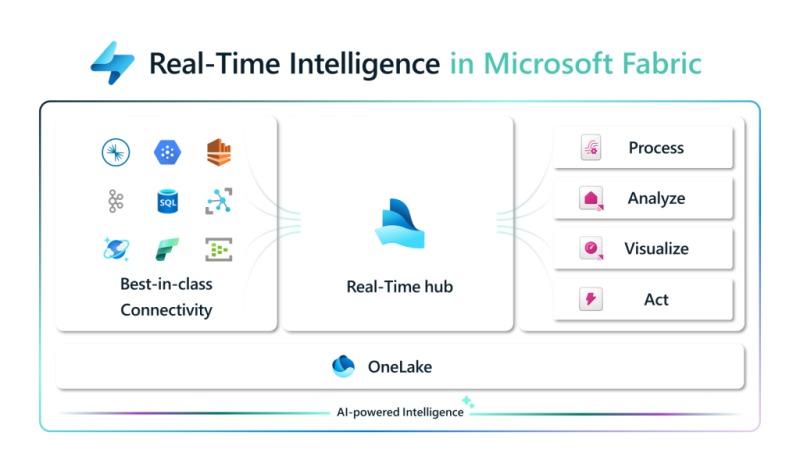Microsoft Fabric gets real-time intelligence to produce instant insights from streaming data
In addition to real-time intelligence, Microsoft is launching a development kit to help developers build custom workloads for Fabric. …

Join us in returning to NYC on June 5th to collaborate with executive leaders in exploring comprehensive methods for auditing AI models regarding bias, performance, and ethical compliance across diverse organizations. Find out how you can attend here.
Today, at its ongoing Build 2024 conference, Microsoft announced a major update for Fabric, its unified platform for end-to-end data analytics. The company said the platform will now have a new workload called Real-Time Intelligence, enabling enterprises to ingest, analyze and take actions on real-time data streams.
While the capability is still in preview, it will enable enterprises to do much more across their data estate, be it informing team leads about idling equipment or reporting a failure on the payment page. According to Arun Ulagaratchagan, corporate vice president for Azure Data at Microsoft, the capability can provide teams with “up-to-the-minute” insights, improving their decision-making in the fast-paced business environment.
“From ingestion to transformation, querying, and taking immediate action, Real-Time Intelligence is an end-to-end experience that enables seamless handling of real-time data without the need to land it first,” he wrote in a blog post.
What to expect from Real-Time Intelligence?
When Microsoft launched Fabric last year, the goal was to provide a unified place where teams could combine all their data and tools to get insights more seamlessly and efficiently.
At launch, the SaaS platform had OneLake (a data lake offering) with seven workloads running atop: Data Factory, Synapse Data Engineering, Synapse Data Science, Synapse Data Warehouse, Synapse Real-Time Analytics, Power BI and Data Activator. Now, the company is merging two of these – Real-Time Analytics and Data Activator – to launch a more capable Real-Time Intelligence workload.
With the new offering, users can ingest streaming data from Microsoft’s sources and third-party cloud providers and platforms using out-of-the-box connectors. Then, using low-code or code-rich experience built by the company, they can transform the streams, query them for instant visual insights and set up actions based on specific events, like issuing an alert when a particular machine starts overheating.
The module is underpinned by a dedicated Real-Time Hub, a single location to discover, manage and consume all the data in motion, including IoT sensor data, weblogs and clickstreams.
“All events that flow through the Real-time hub can be easily transformed and routed to any Fabric data store and users can create new streams that can be discovered and consumed. From the Real-time hub, users can gain insights through the data profile, configure the right level of endorsement, set alerts on changing conditions and more, all without leaving the hub,” Ulagaratchagan noted.

The company has already started testing Real-Time Intelligence with certain companies, including One NZ and Elcome. It hopes that the offering will power various critical use cases such as route optimization in transportation and logistics, grid monitoring in energy and utilities, predictive maintenance in manufacturing and inventory management in retail.
Other improvements for Fabric
In addition to real-time intelligence, Microsoft is launching a Fabric workload development kit in preview. The offering will allow developers to create and launch applications as native workloads within the unified platform. Over the coming months, the company will launch a workload hub to help developers discover, add and manage these custom workloads — without leaving the Fabric environment.
Notably, multiple organizations are already developing for Fabric, including Informatica, Teradata, Neo4j and SAS.
Among other updates, Microsoft is previewing Data workflows – in the Data Factory module of Fabric – to define Directed Acyclic Graphs (DAG) files for complex data workflow orchestration. The company also said it is expanding OneLake shortcuts to connect to data from on-premises and network-restricted data sources and making Copilot for Fabric generally available in the Power BI module of the platform. Other Fabric workloads, including the newly launched Real-Time Intelligence, continue to run Copilot in preview.
Lastly, the company has started testing a new AI-powered Q&A feature called AI skills. This will allow users to ask direct questions about their data, without setting any kind of configuration in advance. It is also in preview at this stage.
Microsoft Build runs from May 21 to May 23, 2024.